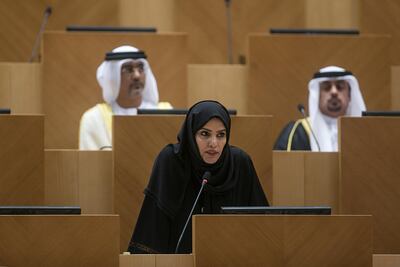A post-coronavirus public health law focused on healthy school meals and better mental health facilities was approved by the Federal National Council on Wednesday.
The advisory council met remotely overnight to discuss the draft bill, which covers a series of health-related issues including services for the elderly and disabled, mental health facilities, standards for baby food and school cafeterias, and credibility criteria for health advertisements.
Under the new law, which must be approved by the Cabinet, a public health committee will be formed to deal with any issues related to the law.
"The draft law aims to set a comprehensive system of rules and scientific procedures to protect public health, whether from a precautionary perspective or scientific evidence," said Dr Hawaa Al Mansoori, head of a health committee that was charged with studied the draft law at the FNC.
One of the main aspects of the law is to place fines on schools that provide unhealthy meals to pupils.
Previously, the Ministry of Health and Prevention had set fines between Dh200,000 and Dh1 million for companies that supply school cafeterias with food that does not meet specific health standards. The manager of the school canteen would also be fined between Dh10,000 to Dh100,000 for serving unhealthy food to children.
On Tuesday, the FNC lowered the fine for suppliers to Dh50,000 – Dh300,000 and reduced the cap for the fine against the canteen supervisor to Dh50,000.
Abdulrahman Al Owais, Minister of Health and Prevention, argued that the original fines were too severe and that canteen supervisors typically have a low income.
Members of the council argued both positions with some saying the health of children was at stake while others argued that the food may be “unhealthy but it is not spoiled or poisonous”.
“The article says ‘food that does not meet the health standards’. It does not have to be damaging, it could be fattening food that has a high percentage of oil or fat and therefore does not meet health standards,” said Mr Al Owais, adding that the goal of the law is to ensure that pupils eat healthy food at school.
Figures from the ministry estimate that 40 per cent of children in the UAE are either obese or overweight, which increases the risk of these children developing Type 2 diabetes.
As a result, the UAE government introduced a lunch box ban on junk foods and fizzy drinks in schools last year.
Parents were prohibited from packing unhealthy food items including processed meats, chocolate bars and spreads for pupils studying at government schools.
Food served at cafeterias is also closely monitored to ensure healthy meals are available for pupils
On Tuesday, the FNC voted to keep the reduced fines but agreed the health of children was paramount.
The draft law also includes fines of between Dh50,000 and Dh150,000 for publishing a health-related advert that does not meet the specific standards.
Other health issues covered by the new regulation include those related to the environmental and noise pollution, which could affect people’s health but no further details were disclosed.
The draft law also requires the ministry to set standards to protect the health of people with disabilities, to co-ordinate between their treatment centres and to provide mental health cover.
FNC member Naema Al Mansoori recommended a mental health facility be set up in every emirate “not just in Abu Dhabi and Dubai” to ensure everyone in need could have access.















